15th International Conference on Computers Helping People with Special Needs (ICCHP)
Wed, 13/07/2016 - Fri, 15/07/2016
The 15th International Conference on Computers Helping People with Special Needs (ICCHP) will take place on 13 - 15 July, 2016 and is organized by the Johannes Kepler University of Linz, Austria.
ICCHP focuses on Assistive Technology (AT) and eAccessibility enabling a more independent life, participation, inclusion and improved services and support for people with disabilities and older adults. By its nature, ICCHP covers a wide area of topics and has a future oriented mission (see below).
One of the keynotes will be given by Therese Willkomm, University of New Hampshire on Low Cost Assistive Technology Solutions for Everyday Living, Learning and Working. ICCHP presents outstanding talks with the potential to raise awarenes for new domains and to open new perspectives for researchers and practitioners in AT and eInclusion. The keynote speeches should make the field of eInclusion reflect and rethink its own practice. They should be provoking and motivating to look accross traditional borders of disciplines.
Conference design
- A scientific conference presenting and discussing reviewed papers (~50% acceptance rate) which will be published in SPRINGER Lecture Notes in Computer Science).
- Special Thematic Sessions organised, chaired and supervised for publishing by leading experts to provide a comprehensive overview to very specific aspects of eAccessibility and eInclusion
- A special track on Universal Learning Design organised by colleagues from the Masaryk University, Brno, Czech Republic
- A Young Researchers Consortium to support the formation of the next generation of experts in eAccessibility and eInclusion
- A Summer University for young blind students intending to enter math, science and engineering studies
- A programming competition final of "C4C - Code for a Cause Europe", organised in the framwork of Project Possibility
- A pre-conference including Workshops/Tutorials and Meetings
- Space for Exhibition and Poster Presentations
- The ICCHP Roland Wagner Award sponsored by the Austrian Computer Society
- An agreeable Social Programme for networking and enjoyment
Conference topics
The following list is not exhaustive and topics are not to be seen isolated. The list should motivate to get involved. ICCHP 2016 is open to visionary ideas and future oriented thoughts – a floor for your visions!
- (e)Accessibility addresses overcoming or proactive avoiding barriers for people with disabilities in the information society, e.g. Web, Software, Document, Communication and Conversation, Consumer Electronic (e.g. iDTV accessibility) Accessibility.
- (e)Ageing and Gerontechnology discusses systems and tools helping to maintain autonomy and independence when ageing. How such systems can be designed for persons who are not familiar with technologies is part of this topic, too.
- Ambient and Assisted Living outlines the potential, accessibility and usability of e.g. embedded systems, smart homes, mobile computing for people with disabilities and older adults.
- Assessment and Profiling calls for research on methodologies, concepts and techniques for evaluating capabilities and needs of individuals and how to translate them into computable requirements and profiles. This should allow better matching of persons and technology.
- Assistive Technology (AT) focuses on innovation and advancing the quality and availability of assistive devices aiming at overcoming or compensating functional limitations and its impact. This includes contributions of mainstream technology showing potential for supporting people with disabilities, special Rehabilitation Technology and Biomedical Engineering.
- Augmented and Alternative Communication (AAC) intends to progress methods and tools for people with problems in spoken and written communication.
- Cloud Computing will analyse the potential of shared and configurable Internet based resources for enhanced AT and services as well as the challenges for eAccessibility.
- Design for All (D4All) highlights the proactive application of principles, methods and tools to meet the requirements of a broad diversity of users including those with disabilities in fields like e.g. architecture, traffic, housing, public buildings, work place, information, education.
- eGovernment and eDemocracy discusses eAccessibility of ICT and Internet based public services for all citizens.
- eHealth - Medicine and Care encourages synergetic aspects of ICT/AT for diagnostics, care, therapy, training and rehabilitation.
- eInclusion, Policies and Legislation outlines programmes, legal contexts and funding opportunities aiming at a better exploitation of ICT, AT and eAccessibility for inclusion.
- eLearning - special and/or inclusive – illustrates new dimensions opened by ICT/AT for didactic and methodological settings and the changing role for learners, teachers and administrators.
- HCI and Non Classical Interfaces will explore the potential of emerging Human-Computer Interaction developments like sensor based interaction, Brain-Computer Interaction (BCI), gesture interaction, natural language interfaces, tangible interfaces, game based interfaces, computer vision, virtual environments, wearable computing, adaptive interfaces, mobile and touch technology.
- History in AT and eInclusion gives a tribute to the founders of our discipline and intends to avoid reinventing the wheels.
- Labour Market Integration discusses how to ameliorate the career opportunities of people with disabilities by using ICT/AT and making the work place accessible and how to better qualify users and professionals.
- Social Innovation and (e)Service Delivery covers all aspects (human, economical, organisational and management) involved in implementing concrete services. ICCHP discusses ideas and concepts of social innovation, e.g. user driven and crowed sourcing approaches, and the potential of ICT/AT and eAccessibility.
- Usability and Ergonomics will focus on day to day use of (accessible) ICT/HCI/AT based systems and services and their efficiency, effectiveness, learnability, memorability, flexibility, joy, … of use for people with disabilities and their environment.
- User centred Design, User Involvement will underline the importance of involving end users in all steps of R&D towards application and will present strategies, methods and experiences for a more user driven R&D practice.
ICCHP provides a unique platform for end users, researchers, developers and practitioners including amongst others:
- Conference website


















